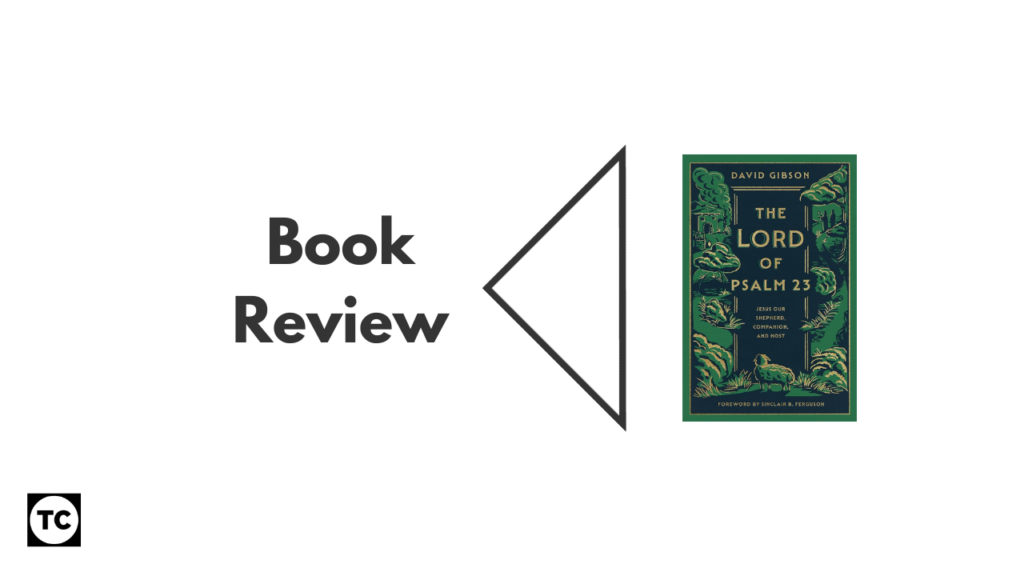
As I’ve worked – gradually – through the Psalms, in an on-off attempt to do ‘A Psalm a Day’, one bumps up against some of the Psalms that pop up in other contexts, like Psalm 22 throughout the New Testament, Psalm 110 in Hebrews, and Psalm 139 when thinking about what it means to be human. Psalm 23 is one of those Psalms – probably the only Psalm that a reasonable number outside the church would have a resonant echo. The opening line – in the KJV translation – is something that appears in a myriad of ways, and yet it speaks to some incredible depths and truth:
“The LORD is my shepherd; I shall not want…”
I read a childrens version of Psalm 23 with my toddlers – they love the imagery, and understand the idea that a shepherd looks after his sheep, and we are God’s sheep.
Familiarity, in the case of Psalm 23, does not breed contempt.
So when I found out that David Gibson, author of among other things one of my favourite books of 2022, ‘Radically Whole’ had written a book on Psalm 23, I was intrigued. Did we really need a whole book, even a shorter one at under 160 pages, on Psalm 23? And, as I read it, the question intensified as Gibson references several, be it a recent one by Richard Briggs, a slightly less recent one by Kenneth Bailey, and an older one by a shepherd called Philip Keller. The simple answer to the question – other than making me want to go and read those three books – is yes, we needed another book on Psalm 23. And I needed to read this book, because it was a still water and a green pasture for my soul.
After an effusive foreword from Sinclair Ferguson, Gibson introduces the Psalm, noting it’s reception and precious nature throughout the church, including a weighty quotation from Calvin which turns our eyes to the fact that “all that is Christ’s becomes ours through our faith-union with him… the very essence of what it means to be a Christian and to have the Lord Jesus as your shepherd” (p. 6-7). There is deep theology here, but it is not overtly technical, and it is mostly behind the scenes. This is a book written to engage a disciples heart, a sheep’s heart, with the beauty of our shepherd, Jesus.
The structure of The Lord of Psalm 23 is simple – and lends itself to slower devotional reading (I made a conscious choice not to read this in one or two sittings, but rather read the intro and the Psalm one day, and then each part over the subsequent three days). I think it would work well as a slow devotional read over 9 days, or three slightly longer chunks. The three ‘Parts’ each have three equally-sized chapters: Part 1 – ‘The Sheep and the Shepherd’ deals with verses 1-3, Part 2 – ‘The Traveler and the Companion beautifully unpacks verse 4, and Part 3 – ‘The Guest and the Host’ rounds out the Psalm and the book with verses 5-6. If you are reading this review and think ‘how can you get three chapters out of one verse’ – please pick up a copy of this book and see how good exposition can make the words sing. It really is beautiful.
You can probably see that I’m a big fan of this book – and I appreciate the way that David has read and sat deeply with Psalm 23. Consider this early observation: “Psalm 23 has become a funeral psalm. But, in fact, it is really a Psalm about life. only one verse out of six speaks about death. The imagery of the psalm is dominated with food, water, rest, security; it’s about going to a banquet where you have perfumed oil poured on your head and you have a cup of wine in your hand where you have to say the host, ‘No, stop, it’s overflowing!’” (p. 21). This is a beautiful reminder of Christian hope over death – on the one hand, realistic about the pain of reality, “Psalm 23 will not deny the darkness” (p. 78) – and on the other, reminding us of the concrete shape of Christian hope: “We should always remember how the Bible ends: on the other side of it all the Lamb wins. The Lamb wins because he is also a Lion. We should never mistake the tenderness of our shepherd for weakness, or his care for us for carelessness about all that threatens us” (p. 93). It is not all easy reading, of feasts and banquets, though. The imagery of darkness, death and the hardship of a shepherd’s life is also in view – with one sobering reminder (among a range of very helpful and pastoral theological reflections) sticking in my mind: “When devotion to hearing his voice begins to dwindle, then eventually, inevitably, departure from his paths begins to follow” (p. 49). This little book of deeper devotion invites us not to give up on the practice of seeking to hear our shepherd’s voice, one vital way of which is personal scripture reading. This book would be a great aid to restarting that practice, or perhaps starting it for the first time.
Overall, then, this was a deeply personally valuable book – meeting me neither in a valley nor a peak, but reminding me of the goodness and grace of my shepherd, Jesus. As Gibson writes, “There is a ready, wide, capacious invitation to any who will come and eat and drink with him. All you need to do is know that you are lost” (p. 117). This book is an invitation to the sheep, to the disciple, wherever they may be, to come and feed. And I recommend it wholeheartedly.
5/5
Leave a Reply